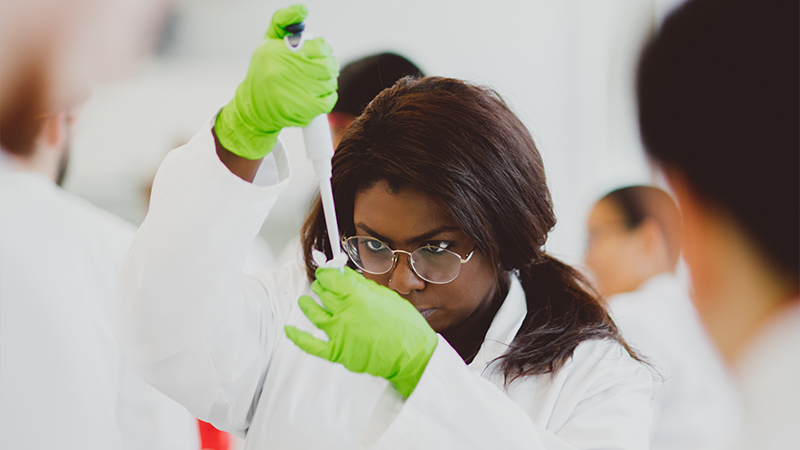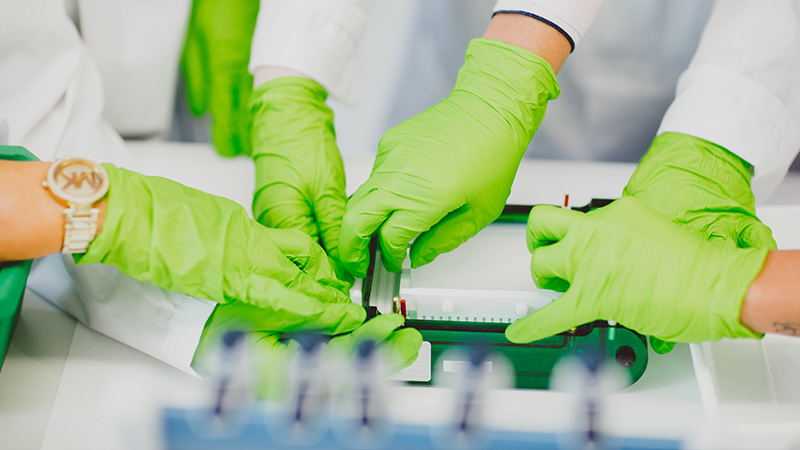Biological and Medical Sciences
MPhil or PhD or Masters by Research
Key facts
Start dates
January 2024 / September 2024
Application deadline
Please allow at least four months between submitting your application and your expected start date, especially if you are an international student arranging a visa.
Location
Course length
Full time: 1 - 3 years
Part time: 2 - 6 years
Funding status
Self-funded
Overview
The Department of Biological and Medical Sciences is a small and friendly department with around 40 research students. The department offers a structured training programme for all students, spanning the subject areas of Cell and Molecular Biology, Biomedical Science and Environmental Biology.
We have close partnerships with hospitals and local industry. Some of our students conduct much of their research within those placements, while others are based in the field or in the department’s own research laboratories.
We welcome applications for projects relating to our research expertise. This covers three main themes:
- Biomedical Sciences
- Molecular Cell and Developmental Biology
- Environmental biology.
You may register for a research degree on a full-time or part-time basis. Applications are welcome from part-time students in employment who wish to undertake a research project connected with their work. We also periodically advertise funded studentships.

Degree routes
All students enrol as probationer research students. During the first year you will formally register your research proposal for one of the below routes.
Masters by Research
These research degrees run for one year full time or two years part time and allow students to critically investigate and evaluate an approved topic and combine the equivalent of up to one semester’s taught programme (focusing on research training) with a major research project. As with other research degrees, they are examined by thesis and viva.
Length of study: Full-time: 1 year. Part-time: 2 years.
Entry requirement: The minimum entry requirement for the degree of MA, MSc and LLM by Research is a lower second-class UK honours degree or equivalent qualification.
MPhil
If you undertake an MPhil you will:
- critically investigate and evaluate an approved topic
- demonstrate understanding of research methods appropriate to the chosen field
- Present and defend a substantial thesis by viva.
Length of study: Full-time: 2 years. Part-time: 3 years.
Entry requirement: The minimum entry requirement for an MPhil degree, or an MPhil with the intention of transferring to a PhD, is a first-class or upper second-class UK honours degree or equivalent qualification.
Applications are also welcomed from those holding qualifications other than the above and will be considered on their merits and in relation to the nature and scope of the work proposed. You will be required to provide the names of two academic referees.
MPhil with the possibility of transfer to a PhD
A candidate registered initially for an MPhil may be able to transfer to a PhD, and has to complete a transfer process within the Faculty, once sufficient progress has been made on the work to provide on the evidence of the development to PhD.
This is normally after 18 months of full-time study or 24-26 months of part-time study). Transfer comprises three main elements:
- a 1000 word transfer report which should be sent to the relevant Postgraduate Research Tutor and the supervisory team
- an oral presentation and/or interview
- an additional piece of work as indicated by the Faculty, Department/School or supervisory team.
Length of study: Full-time: 3 years. Part-time: 4 years.
PhD (direct entry)
If you undertake a PhD you will:
- critically investigate and evaluate an approved topic, resulting in an independent and original contribution to the field
- demonstrate understanding of research methods appropriate to the chosen field
- present and defend a substantial thesis by viva.
Length of study: Full-time: 2 years. Part-time: 3 years.
Entry requirement: The normal entry requirement for the degree of PhD is a master’s degree in a discipline which is appropriate to the proposed research and which has included research training and a research project.
In exceptional cases, applicants who have a good honours degree (or equivalent) may apply for direct registration to PhD if they have appropriate research or professional experience at postgraduate level which has resulted in published work, written reports or other appropriate evidence of accomplishment.
Learning and assessment
You will be supported by a supervisory team, usually two people, who are experts in their field and provide direction and support.
We take a structured and pro-active approach to supporting the success of our students. This includes regular assessment points involving written reports and supportive interviews (where the views of people outside the supervisory team are given).
We also encourage our students to present their work on a regular basis. All research groups have regular group meetings (often at lunchtime) where students present their work to peers and these form a central part of the development of research.

After you graduate
Career prospects
Much of our training is aimed at helping you to achieve excellence in your research degree. We'll help you to identify the skills that are appropriate for further employment and explore your career aims.
We are proud of the fact that many of our students go on to postdoctoral research posts. If research is not your long term career aim, we'll support you to identify likely areas of employment and to develop the skills that you'll need.
We also aim to keep strong links with our alumni and support them as their careers develop.
How to apply
Entry requirements
All students must be able to meet the University’s requirements for a research degree, which is to be able to devote a minimum of 35 hours per week (full-time) or 15 hours per week (part-time) to the programme of research.
The minimum entry requirement for the degree of MPhil, or MPhil with transfer to PhD, is a first-class or upper second-class UK honours degree or equivalent qualification.
The normal entry requirement for a PhD is a Masters degree, or exceptionally a good honours degree/equivalent.
The minimum entry requirement for the degree of MA, MSc and LLM by Research is a lower second-class UK honours degree or equivalent qualification.
English language requirements
Our requirement is IELTS: 6.5-7.0 overall, with a minimum of 6.0 in each component (reading, writing, listening and speaking), depending on the subject. Please note that an IELTS certificate must be current; they are only valid for 2 years from issue. For further information about the test visit the IELTS website. Please note that we are unable to accept TOEFL qualifications.
However, there may be some exceptions. See UK Government visa information for more detail on the information.
English requirements for visas
If you need a student visa to enter the UK you will need to meet the UK Visas and Immigration minimum language requirements as well as the University's requirements. Find out more about English language requirements.
Application process
We welcome initial enquiries. Please contact the Research Administrator (hlsapplications@brookes.ac.uk) and/or the relevant Postgraduate Tutor or Supervisor.
- If you have a research proposal in mind, explore our research groups and supervisory staff webpages, to identify the relevant research group/s for your research.
- Check the fees information on the university website. Oxford Brookes Alumni may be entitled to a discount on course fees.
- Email your CV and an outline of your area of interest to hlsapplications@brookes.ac.uk. Give a brief explanation of how your studies will be funded.
- Once we have the initial information we will liaise with you as necessary and pass the information to the relevant Postgraduate Tutor/s, who will advise whether an application can be progressed. If this is possible we will invite you to submit an application through the university system.
Tuition fees
Tuition fees
Fees quoted are for the first year only. If you are studying a course that lasts longer than one year, your fees will increase each year.
For International fees the following factors will be taken into account by the University when it is setting the annual fees: inflationary measures such as the retail price indices, projected increases in University costs, changes in the level of funding received from Government sources, admissions statistics and access considerations including the availability of student support.
Home fees are set by UK Research and Innovation (UKRI) and are released approximately five months before the start of each academic year.
If you have any questions about fees, get in touch with the Research Degrees Team at rdt-researchdegrees@brookes.ac.uk.
How and when to pay
Tuition fee instalments for the semester are due by the Monday of week 1 of each semester. Students are not liable for full fees for that semester if they leave before week 4. If the leaving date is after week 4, full fees for the semester are payable.
- For information on payment methods please see our Make a Payment page.
- For information about refunds please visit our Refund policy page
Compulsory costs
| Additional costs | Amount (£) |
|---|---|
Continuation fee The continuation fee, where it is payable is compulsory, but not applicable to Masters by research or PhD by Published Work, detailed as follows:
|
£1455 |
Optional costs
| Additional costs | Amount (£) |
|---|---|
Bench fees for full-time study will be calculated on an individual basis and the amount will depend on the subject and project. In some cases no bench fee will be charged. |
£1000-6000 |
Bench fees for part-time study will be calculated on an individual basis and the amount will depend on the subject and project. In some cases no bench fee will be charged. |
£500-3000 |
It’s your responsibility to cover print / binding costs where coursework submission is required. Please note that a lot of the coursework is now submitted online. |
From £30 |
| You may choose to purchase books to support your studies. Many books on our reading lists are available via the Library, or can be purchased secondhand. | £20-60 per book |
Accommodation fees in Brookes Letting (most do not include bills) |
£94-265 per week |
Accommodation fees in university halls (bills included, excluding laundry costs) |
£122-180 per week |
Graduation costs include tickets, gowning and photography. Gowns are not compulsory but typically students do hire robes, starting at £41. |
Typically £0-200 |
Students are responsible for their own travel to and from university for classes. BrookesBus travel is subsidised for full-time undergraduate students that are on a course with a fee of £9,250 or more, or living in an Oxford Brookes hall of residence. There is an administration fee for the production of a BrookesKey. |
From £10 |
Resubmission fees If following viva, examiners recommend that a student is required to revise and resubmit their thesis for re-examination, they must pay the resubmission fee for the duration of that period. |
£1455 |
Funding your studies
Financial support and scholarships
Featured funding opportunities available for this course.
